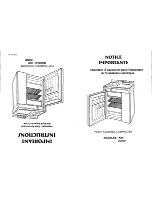
33
4.10 PRESSURE SWITCHES
Do not use a nitrogen cylinder without a pressure
regulator. (See Figure 12) Cylinder pressure is
approximately 2350 PSIG. Do not use oxygen in or
near a refrigerant system as an explosion may occur.
1.
Cylinder valve and gauge
2.
Pressure regulator
3.
Nitrogen cylinder
4.
Pressure gauge
5.
¼ inch connection to Gauge Manifold
4.10.1 Removing switches
1.
A Schrader valve is located under each
switch to allow removal and installation
without releasing the refrigerant charge.
2.
Remove switch and test in accordance with
paragraph 4.10.2.
3.
Replace or reinstall switch.
NOTE:
IF THE HIGH/LOW-PRESSURE SWITCH DOES NOT
PASS THE OHM TESTING WHILE INSTALLED AND
PRESSSURES ARE IN TOLERANCE. REPLACE SWITCH
IMMEDIATLY.
(Pressure above 0 and below 450 with OPEN- LINE on
switch)
4.10.2 Testing Pressure Switch
In working condition and correct operation the switch
should be a “closed line” or circuit.
In working condition and incorrect operation of unit
(Overly high head pressure or Low suction pressure) the
switch should be a “open line” or circuit.
To test the pressure switch to see if calibration is off.
Preform the necessary steps below:
1.
Remove switch as outlined in paragraph
4.10.1
2.
Connect ohmmeter across switch terminals.
Ohm-meter will indicate resistance if switch
is closed after relieving pressure.
3.
Connect switch to a cylinder of dry nitrogen
4.
Set nitrogen pressure regulator higher than
switch- over point on switch being tested.
Pressure switch settings points are provided
in the Specification of the unit on Page 5.
5.
Close valve on cylinder and open bleed-off
valve.
6.
Open cylinder valve. While observing meter,
slowly close bleed-off valve and increase
pressure until the switch opens. Slowly open
bleed-off valve (to decrease pressure) until
switch reverts to normal position.
7.
If switch does not activate within tolerance
provided, replace switch. Test new switch
before installation.
Figure 16 - Nitrogen Test Setup
















































